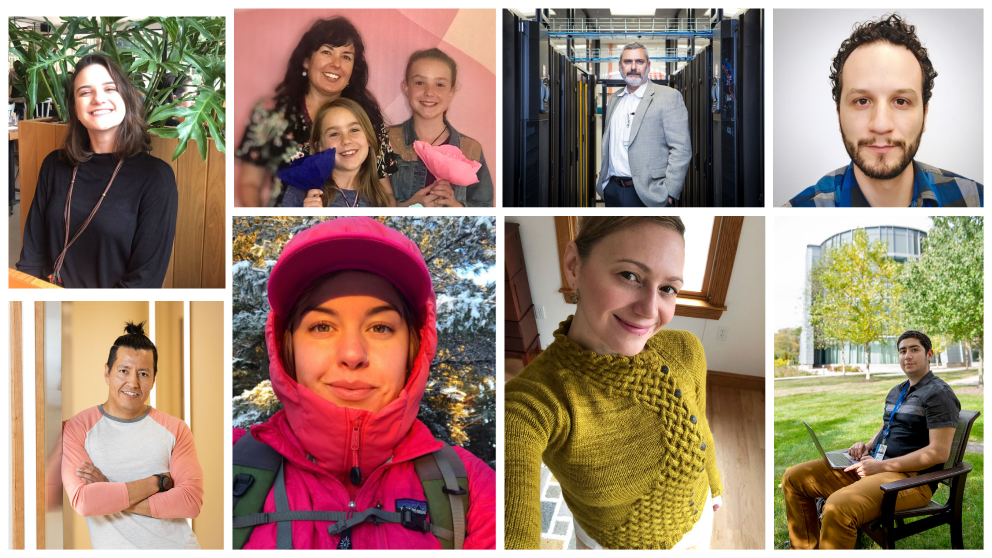
Happy Hispanic Heritage Month from The Jackson Laboratory! We interviewed some of JAX’s Hispanic and Latinx employees from various campuses and job roles, to ask about their work here at JAX and their heritage.
Daniel Cortés-Perez
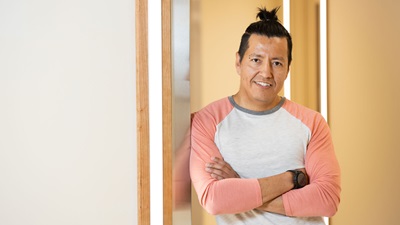
Daniel Cortes-Perez, Ph.D.Stem cell biology and neural differentiation to study neurological diseases and aging using genetic approaches. Axonal repair, neurotrophic factors and DYRK1a are also of interestPostdoctoral associate Daniel Cortés-Perez, Ph.D., conducts research in Martin Pera’s lab. He studies neurological disorders and recently received the JAX Scholar Award to utilize stem cell biology and neural differentiation for the study of neurological diseases, like stroke.
What brought you to JAX?
“If you want to work with genetics, The Jackson Laboratory is one of ‘the places’ to be. When I googled JAX, I didn’t know much about Bar Harbor. I found that it’s in a national park and I got so excited because I love being outside. I’m a mountain guy and being surrounded by nature and being able to go for a hike was a dream come true.
What do you like about working at JAX?
“The JAX community is really tight. Everybody’s open to giving advice, sometimes in the hallways, and sometimes they will have an open door. That’s something that is pretty cool.”
How do you identify?
“Mexican.”
What makes you proud of your heritage?
“The pre-Colombian history and the landscape of the countryside.”
Dayana Krawchuk
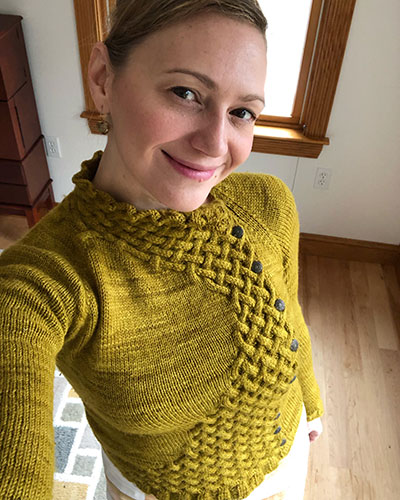
Dayana Krawchuk, Ph.D., is our marketing manager! She is the “brain” behind JAX’s entire social media presence and manages digital sponsored content. She’s also been known to spotlight as a writer, producer, and actor for JAX’s Minute to UnderstandingMinute to Understanding videos are bite-sized science features from the Jackson Laboratory to help people learn basic terms and keep up with the latest breakthroughs.Minute to Understanding series.
Dayana has a Ph.D. in Genetics and Developmental Biology and originally joined JAX as a postdoctoral associate in Robert Braun’s lab.
How do you identify and what makes you proud of your heritage?
“I identify as Latina. My mother is Puerto Rican and only spoke Spanish to me growing up in a very English world (upstate New York). She also sent me out on my own to Puerto Rico every summer between the ages of 5 and 17, so that had a huge impact on my cultural upbringing. My father is polish Canadian, which is fantastic too.
I loved being part of a cultural soup – literally. We’d serve pasteles (meat/vegetables wrapped in a grated green banana dough and banana leaves) and pierogis on the same table. I strongly believe that a biracial household gave me a unique opportunity to become a unique person in the world. It’s even reflected in my name, which has to be the only instance of it in the world: Dayana (a Hispanic name, pronounced Dah-jah-na by my Puerto Rican side and Diana by my Canadian side) Krawchuk (Polish to the max!).”
Anything else you’d like to include?
“If it weren’t for research opportunities made available to U.S. minorities, such as Latinx, I’m not sure I would have ever gotten my Ph.D. When looking for my first summer job in high school, my counselor pointed out that there was a paid NIH High School Research Fellowship available at Albany Medical School for minority groups. I mean, I was looking at mall jobs in retail and wasn’t considering any sort of science career that early!
My incredible experience in that program sealed my fate, and by age 36 I had been working in labs for 20 years. Because of my experience, I feel very strongly that we need to do anything possible to continue enabling young women to follow science-based careers, especially those of historically underrepresented backgrounds. I may be a marketing manager now, but everything I do at JAX still fundamentally hinges on my understanding of science and finding innovative ways to best communicate it to people of all backgrounds and ages.”
Oceanna Hussey
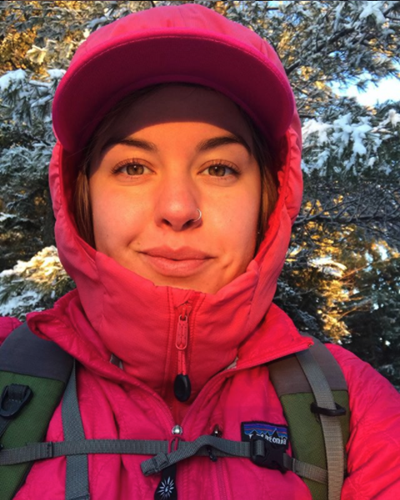
Oceanna Hussey is an animal care trainee at JAX! She works hands on with JAX mice and her position involves lots of interpersonal communications with research staff regarding welfare of their animals.
What brought you to JAX?
“I came to JAX because of all of the opportunities afforded at the lab. So far, I’ve really gotten into the continuing education Courses and WorkshopsOffering educational programs virtually, in Maine, Connecticut and across the globe!courses offered by JAX. I’m always excited to start a new lesson.”
What do you like about working at JAX?
“The JAX Bar Harbor campus is such a great location, especially if you’re an outdoors enthusiast like me. The proximity to Acadia National Park and all the recreational activities are a huge benefit. The biggest con is trying to decide whether I want to hike or climb after work—ha!”
How do you identify?
“Bi-racial Latina.”
What makes you proud of your heritage?
“I’m proud of our rich traditions. Many that are still alive today, such as family closeness – not only on holidays, but every day. We love our families and take care of them for life!”
Eduardo Zaborowski
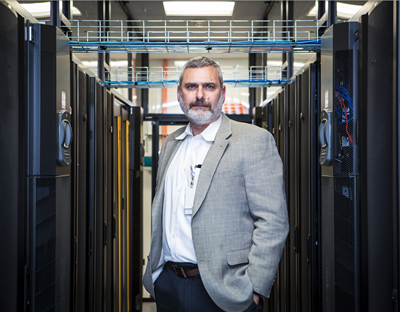
Eduardo Zaborowski is a Senior Director in the Information Technology department, responsible for the systems that support research at JAX. His team builds and runs the platforms used by scientists in the “wet labs”, scientific services, and increasingly in the “dry labs” where computational biologists use large genomic, imaging, and other datasets to study human diseases. The computational infrastructure allows these scientists to study and decipher the causes and mechanisms of the diseases and lead the search for tomorrow’s cures.
What is a project that you’re excited about?
“My team and I got involved in March with a small effort to implement the computational infrastructure for testing for the SARS-CoV2 – the virus that causes COVID-19. We managed to spin up a solution in a matter of weeks, and thanks to that initiative, JAX today can test thousands of samples a day, helping communities and hospitals stay safe.”
What brought you to JAX?
“The mission of the lab, and the ability to make a difference. In five years, I built a team of 30 engineers and scientists that setup an infrastructure that is at par with any academic and non-profit research institute, making a difference every day.”
How do you identify?
“I was born in Brazil and lived for more than a decade in Israel, where I went to graduate school before coming to the US. I identify as Brazilian-Israeli-American.”
What makes you proud of your heritage?
“Brazil was a country that accepted refugees from Poland when others closed their borders before World War II. My dad came to Brazil as an infant, and without that opportunity who knows if he would even have escaped the horrors of the war. Brazilians are very tolerant of race, religion, ethnicity and other unique identifiers, and I am very proud of that.”
Rodrigo Castro
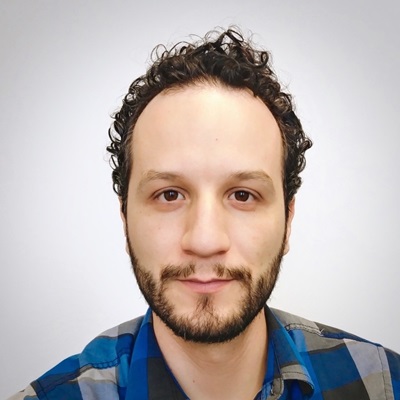
Rodrigo Castro, Ph.D., is a postdoctoral associate in Ryan Tewhey’s lab. He is working on developing generative machine learning models of new cis-regulatory elements using deep learning techniques.
What brought you to JAX?
“The research direction of my PI, Ryan Tewhey, the prominence of JAX, and the adventure of living in the area.”
How do you identify?
“I identify as Mexican.”
What makes you proud of your heritage?
“One thing that I am particularly fond of in the Hispanic culture is the personality and diversity of its music. In particular, the music community in Latin American seems to relate to the music of other cultures easily, and through that, unveil aspects of ourselves that are shared with people from other parts of the world. This somehow feels like an important part of the ongoing process of understanding our own heritage, as well as expanding our sense of community beyond our lands and ethnicity. I like that.”
Isabela Gerdes Gyuricza
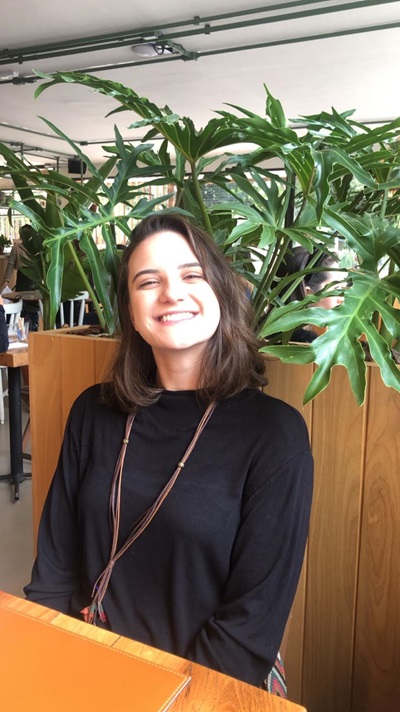
Isabela Gerdes Gyuricza is a research data analyst in Gary Churchill’s lab. She processes and analyzes data produced in the “wet lab”. In the end she gets to interpret the data and extract biological meaning (this is the fun part, she says!).
What is a project that you’re excited about?
“My lab recently published a paper on BioRxiv in which we used transcript and protein expression data from hearts of Diversity Outbred (DO) mice of different ages to reveal some interesting aspects of the biology of aging in the heart.”
What brought you to JAX?
“I have been working with mouse models since my undergraduate research, so I knew about JAX because of JAX Mice. In 2017, my master’s advisor, Professor Lygia Pereira, and the research funding agencies in Brazil sponsored me to fly to Bar Harbor to participate in the McKusick Short Course and it was amazing! It opened my mind about all the incredible research being done at JAX. I also had the opportunity to meet some great professors, such as Gregory Cox and Gary Churchill.
This course also made me realize the importance of big data being generated by modern science and the shortage of people to analyze the information. Then, I decided to explore the computational side of biology by doing a 6-month internship at the Churchill lab at JAX. This was only possible due to a scholarship from the state funding agency in Brazil (FAPESP).
I enjoyed my work in computation biology during those 6 months and I learned so much from everyone in the Churchill lab and Gary, who is an amazing mentor.
After getting my master’s degree, I decided I wanted to come back to JAX. So, I applied for a job as a research data analyst in the Churchill lab and here I am now!”
What makes you proud of your heritage?
“I am proud of the diversity in Brazil. We are composed of people from different origins, spread all over the country, resulting in a very diverse culture. This diversity is observed in our history, culture, food and music. I am also very proud about the importance that Brazilians give to socialization and community. We value our moments at the table with friends and family eating our daily rice and beans while listening to good music.”
Is there anything else you’d like to include?
“I would like to acknowledge the importance of the public education system in Brazil. We have tons of federal and state universities spread all over the country that provide education and opportunities to people at zero cost. I did both my undergraduate and graduate studies in a public university, which made my professional goals possible. Some parts of the current government have been trying to disparage these universities, but I would like to emphasize how these schools are crucial to keep education, science and technology running in Brazil.”
Deanna Dominguez
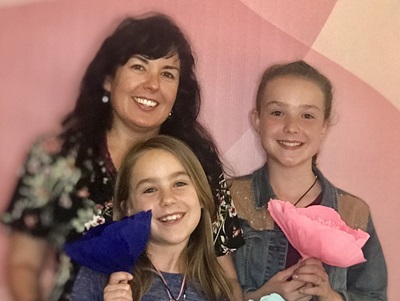
Deanna Dominguez is a human resources generalist. She helps employees with benefits, leave of absences, working relationship issues, and other important day-to-day support. “It helps that I picked up a lot of the trade at JAX along the way from my time in EHSS, Operations and under the wing of my last manager,” she says.
What brought you to JAX?
"I came to JAX because at the time I was going to school for biochemical engineering and wanted to start a career in the bioscience field. The Jackson Laboratory not only fit my interest at the time, but the culture fit the change in direction that I was looking for as well. JAX has many learning opportunities and accessibility to science that is not easily granted to those that want to be a part of something bigger in the science and research community."
How do you identify?
“Mexican-Irish/Mexican American.”
What makes you proud of your heritage?
“While I grew up in the states (in Arizona and California mostly), my family was still very attached to their culture and heritage with having big celebrations and get-togethers, and always putting family first. Even in hard times, family was always there and willing to pitch in where they could.
I appreciate that my legacy is hardworking, and our work is often human, artistic, traditional, and considerate of making someone feel joy whether in craftsmanship, art, architecture, or customer service. I believe we are a humble and nurturing ethos.”
Anything else you would like to add?
“I am very grateful for the challenges that have been given to me in order to grow in pride and freedom and I get to pass on this legacy and art to my daughters.”
Jacob Flores
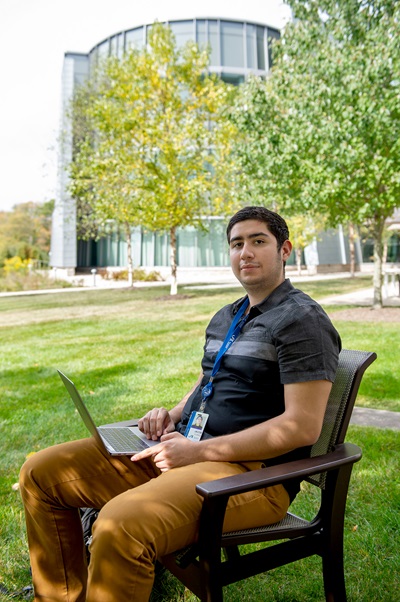
Jacob Flores is a postbaccalaureate intern in Christine Beck’s lab. He joined JAX in October with the Postbaccs at JAXRecent undergrads join PostBacc @ JAX to prepare for dual degrees in biomedical sciencesFall cohort of PostBacc interns.
In this role, Jacob will utilize genomics, bioinformatics and molecular biological techniques to investigate the ways in which repetitive DNA elements, such as transposons, affect human genomes.
What brought you to JAX?
I hope to meet mentors and professionals in research and medical fields who will help me define my specific research interests and abilities.
How do you identify?
“I identify as Mexican American.”
What makes you proud of your heritage?
“I am proud of my heritage for emphasizing a strong unity and support system found through family. Through my own close ties with my family, I was able to learn a multitude of life lessons. Having a close and interactive family also gave the important feeling that celebrations/accomplishments were that much more meaningful and passionate.”
Anything else you’d like to add?
“I would like to appreciate and thank the Postbaccs at JAXRecent undergrads join PostBacc @ JAX to prepare for dual degrees in biomedical sciencesPostBacc at JAX program for creating an opportunity dedicated to increasing diversity and inclusion of underrepresented racial groups in the biomedical sciences. This includes members belonging to the Latinx community.”